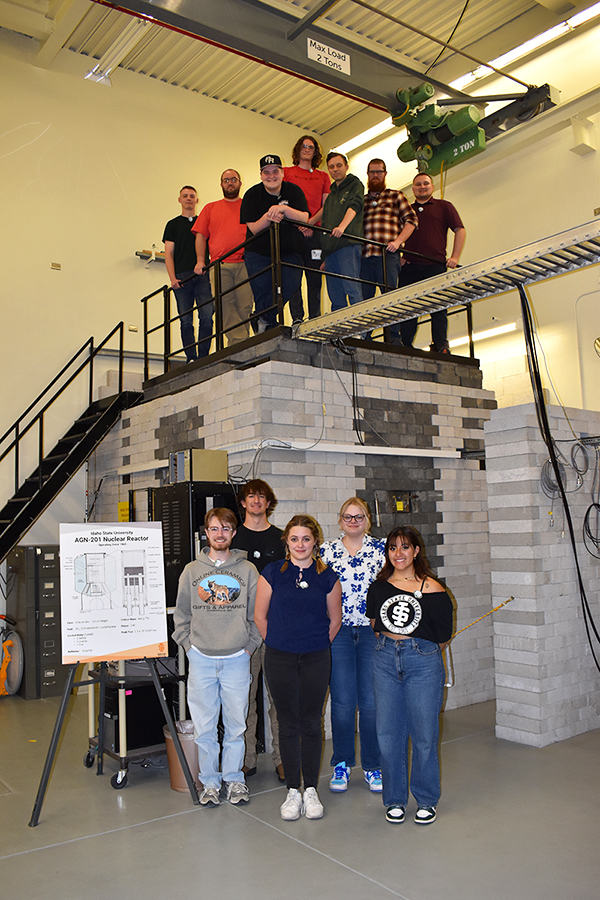Ten ISU Students Pass Nuclear Reactor Operator Exam to Become Licensed
May 19, 2025
Idaho State University students have earned a rare and nationally recognized credential: a U.S. Nuclear Regulatory Commission (NRC) Reactor Operator license.
This spring, 10 students—six from the College of Technology’s nuclear operations technology program and four from the College of Science and Engineering’s nuclear engineering program—successfully passed the NRC’s rigorous reactor operator (RO) exam. The students who qualified to take the exam were: Ryan Chapman, Kole Brown, Tek Jones, Timothy Kampworth, Parker Johnson and Truman Reading from the College of Technology, along with Brady Stein, Alexis Olaveson, Addy Nielsen, and Kyler Johnson from the Department of Nuclear Engineering.

This marks a significant jump from previous years, when only one student from the College of Technology earned the license each year. Earning this license not only allows students to operate ISU’s research reactor while finishing their degrees, but also positions them for strong careers in the nuclear industry. Students earned their licenses by training on ISU’s Aerojet-General Nucleonics (AGN-201) nuclear reactor, a rare testing and training reactor. Only a handful of universities in the nation offer this kind of opportunity, making ISU’s programs stand out both regionally and nationally. The preparatory course, co-taught and cross-listed between the College of Technology and the Department of Nuclear Engineering, combines expertise from both programs to ensure students are ready to operate the reactor safely and effectively.
The NRC exam consists of a hands-on practical demonstration, an oral board testing deep understanding and decision-making under pressure, and a written exam covering reactor theory, radiation safety, facility operations, and more. Students spend the entire semester preparing, and only those earning an A in the course qualify to sit for the exam.
A key factor for this year’s record number of students earning licenses was the mentorship provided by students who had passed the exam in 2024. Jonathan Garritson, from the College of Technology, and Angela Trejo, from the College of Science and Engineering, both returned to guide and train this year’s cohort — their direct training and supervision significantly boosting qualification numbers and pass rates.
“I started this certification because it is a highly competitive field with a lot of candidates, and this sets you apart from the rest,” explained Garritson. “It is a valuable opportunity to be able to get nationally recognized and certified at a training and education reactor. It is not very common in the industry where people fresh out of a two-year degree can enter into the industry with relevant experience outside of practical and classroom knowledge.”
”I took this course and got my RO license because our reactor is so unique — not just in the U.S., but around the world,” said Trejo. “It was an amazing experience to earn a national NRC license. I also loved getting other students excited about the reactor. Not many people know we have one on campus, so having students ask questions and want to learn more was a big reason why I got involved.“
Another benefit of this mentorship approach is the preparation it provides for what will be expected of students after graduation.
“It is really rewarding to see one of our College of Technology students gain the competence, get the license, and be able to do a really good job passing down to the next cohort how to prepare for the exam and operate the reactor," said Mackenzie Gorham, program coordinator for the nuclear operations technology program. “He was able to begin sharpening his skills for going into the industry, and the continuous training and peer training that he’ll be doing there.”
This nationally recognized license gives graduates a competitive edge in the job market, demonstrating not just technical expertise but also the ability to apply it hands-on, qualities employers value highly.
“We have received reports from graduates from both programs that having the license was a deciding factor in their hiring,” said Mary Lou Dunzik-Gougar, a professor of nuclear engineering for the College of Science and Engineering. “Having the license demonstrates an ability to learn and apply knowledge in a hands-on manner that isn't easily demonstrated by academic grades. Any new job will require training. So, employers like to see examples of having the aptitude to train well.”
By offering this unique combination of rigorous technical education, hands-on reactor experience, and peer mentorship, Idaho State University’s College of Technology and Department of Nuclear Engineering are giving students a powerful advantage as they prepare to lead the future of nuclear energy.
Categories:
College of Science and EngineeringCollege of TechnologyUniversity News
